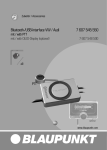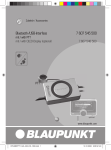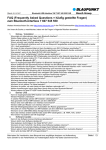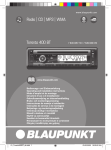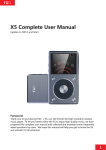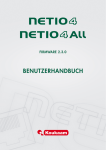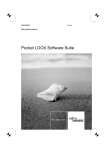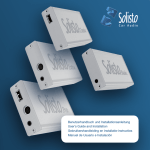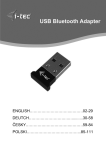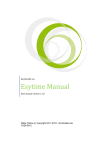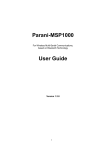Download Blaupunkt 7 607 548 500 Technical data
Transcript
Zubehör / Accessories
Bluetooth-/USB-Interface VW / Audi
mit / with PTT
mit / with OLED-Display (optional)
7 607 545 550
7 607 548 500
PTT
optional
www.blaupunkt.com
Connection / Anschluss
Fakra
OLED
(not included)
PTT (Push to talk) - key
Microphone
BLA
UPU
NKT
GROUND
th
oo
et
10
Blu
Pin9
(Fakra)
Pin 2
(ISO)
Radio Mute
Pin9
(Fakra)
Fakra
7 607 001 539
2
oder/or
GROUND
USB socket
(Memory stick not included)
Connection / Anschluss
ISO
PTT (Push to talk) - key
OLED
(not included)
Microphone
BLA
UPU
NKT
10
10
Blu
th
oo
et
oder/or
GROUND
7
135
Pin 2
(ISO)
68
2
USB socket (Memory stick not included)
ISO Audi
C3
OLED
(not included)
Microphone
A
D
PTT (Push to talk) - key
BLA
UPU
NKT
7 607 001 540
GROUND
Blu
th
oo
et
oder/or
Pin 9
Pin 9
USB socket (Memory stick not included)
3
Technical Data / Technische Daten
Bluetooth
1.2 (compatible with 1.x)
Supported Bluetooth profiles
Unterstützte Bluetooth-Profile
HFP, SPP, GAP, SDAP. AADP (A2DP), AVRCP
Certifications
Standards
e1, CE, FCC, Bluetooth
USB
Version 2.0 (full speed), (compatible with 1.x)
Mass Storage Device Class
MP3-USB-Bitrate
max. 320 kb/s, max. 48 kHz sample rate
MP3 Meta Data
ID3 v1, v2 (ISO8859-1 and ASCII), max.32char Title,
Album, Artist
WAV Playback
uncompressed WAV, 8, 11.25, 12, 16, 22.5, 24, 32, 44.1, 48 kHz
WAV Meta Data
Filename, Directoryname
Playlist
M3U format supported, Latin-1 char set,
see e.g. http://en.wikipedia.org/wiki/M3U
Data Structure
max. 64000 files and directories, up to 5 directory levels,
Temperature range
Temperaturbereich
- 40° C ... 85° C
USB voltage / current strength
USB-Spannung / -Stromstärke
5V / 0,5 A (1,0 A short term / kurzzeitig)
Power Supply
Spannungsversorgung
+12 ... 28 V
Dimensions (inch)
Abmessungen (mm)
1.1 x 3.2 x 4.8 (without cables)
28 x 81 x 121 (ohne Kabel)
Weight
Gewicht
300 g
For / Für VW, Audi, Seat, Skoda, Ford Radios see / siehe www.blaupunkt.com
Bluetooth USB Interface VW Compatibility list of OEM devices
Bluetooth-USB-Interface-VW Kompatibilitätsliste Erstausrüstergeräte
4
Anschluß ................................................................... 2
Technische Daten ...................................................... 4
Sicherheitshinweise .................................................. 6
Konformitätserklärung .............................................. 6
Einschalten ............................................................... 6
Ausschalten .............................................................. 6
Anzeigen und Bedienungen ........................................ 7
Koppeln (Pairing) Ihres Mobiltelefons
mit dem Interface ...................................................... 7
Zwei BT-Geräte gleichzeitig mit
dem Interface verbinden ............................................ 8
Funktionsübersicht .................................................... 9
Telefon: Ankommender Anruf ................................... 11
Telefon: Abgehender Anruf....................................... 11
Audiostreaming über BT ........................................... 11
MP3-Wiedergabe über USB ...................................... 12
Browsing (OLED) ..................................................... 12
Ordnerverwaltung /
Struktur auf dem USB-Wechseldatenträger ............... 13
Einstellungs-Menü (nur OLED) .................................. 14
Sprachumstellung.................................................... 15
Einstellungs-Menü ................................................... 16
Software Aktualisierung .......................................... 21
Auslesen Technischer Daten ..................................... 21
Änderung der Konfiguration (PTT) ............................ 22
5
DEUTSCH
Liebe Kundin, lieber Kunde,
Für unsere innerhalb der Europäischen
Union gekauften Produkte, geben wir eine
Herstellergarantie. Die Garantiebedingungen können Sie unter www.blaupunkt.de abrufen oder
direkt anfordern bei:
in der jetzt vorliegenden Firmware „SW8625
VW“ für das Bluetooth-USB-Interface (BT-USBInterface, 7607 545 500 001) gibt es einige neue Funktionen, die wir Ihnen nachstehend
erläutern.
Blaupunkt GmbH
Hotline
Robert Bosch Str. 200
Wesentliche Neuerung ab SW8625VW ist
die Unterstützung für das OLED Display
(7 607 548 500 001).
D-31139 Hildesheim
Achtung:
Sicherheitshinweise
Vor dem Bohren der Befestigungslöcher sicherstellen, daß keine verlegten Kabel oder
Fahrzeugteile beschädigt werden.
Verbauen Sie die USB Buchse, das Microphon und
den PTT Knopf nicht in den Aufblasbereich der
Airbags und sorgen Sie für eine sichere Ablage, damit die Fahrzeuginsassen bei einer Notbremsung
nicht gefährdet werden. An scharfkantigen
Löchern Kabeldurchführungen verwenden.
Für die Dauer der Montage und
des Anschlusses ist der Minuspol
der Batterie abzuklemmen.
Hierbei sind die Sicherheitshinweise des KfzHerstellers (Airbag, Alarmanlagen, Bordcomputer,
Wegfahrsperren) zu beachten.
Recycling und Entsorgung
Bitte nutzen Sie zur Entsorgung des Produktes
die zur Verfügung stehenden Rückgabe- und
Sammelsysteme.
Konformitätserklärung
Hiermit erklärt die Blaupunkt GmbH, dass sich das
Gerät Bluetooth/USB-Interface in Übereinstimmung
mit den grundlegenden Anforderungen und den übrigen einschlägigen Bestimmungen der Richtlinie
1999/5/EG befindet.
6
Vor Inbetriebnahme des OLED-Displays
ist ein Update der Firmware Ihres BT-USBInterfaces erforderlich (siehe Abschnitt
Softwareaktualisierung).
Die folgende Anleitung geht davon aus, dass die
Firmware Ihres BT-USB-Interfaces bereits aktualisiert und die Sprache auf Deutsch eingestellt wurde (siehe Abschnitt Einstellungsmenü).
Diese Firmware können Sie auch wie die bisherigen Versionen mit Ihrem PTT nutzen. Die folgend genannten OLED-spezifischen Bedien- und
Anzeigemöglichkeiten stehen Ihnen in diesem Fall
nicht zur Verfügung.
Einschalten
Das OLED-Display schaltet automatisch ein, sobald Sie Ihr Radio- oder Radio-Navigations-Gerät
(RNS) einschalten.
Ausschalten
Das OLED-Display schaltet automatisch aus, sobald Sie Ihr Radio- oder Radio-Navigations-Gerät
(RNS) ausschalten.
Sie können das Display auch manuell abschalten; dazu halten Sie bitte den roten Telefonknopf
länger als 5 Sekunden lang gedrückt. Zur besseren nächtlichen Orientierung bleiben die Tasten
beleuchtet.
Im Einstellungs-Menü „Display -> Standby“ können Sie eine Zeit vorwählen, nach der das Display
bei eingeschaltetem Radio automatisch abschaltet, um beispielsweise die mögliche Ablenkung des
Fahrers zu reduzieren. Im Menüpunkt „Display ->
Einschalten“ wählen Sie aus, wodurch das Display
wieder eingeschaltet wird.
Sollte nach manuellem oder automatischem
Abschalten ein Anruf eingehen, dann schaltet sich
das Display automatisch wieder ein (sofern das
Radio noch eingeschaltet ist).
Anzeigen und Bedienungen
Das OLED-Display zeigt abhängig vom aktuellen Zustand Ihres BT-USB-Interfaces
verschiedene Informationen an. Welche
Bedienmöglichkeiten über die grüne (links) und
rote (rechts) Telefontaste sowie den zentralen
Dreh-Drückgeber bestehen, erfahren Sie in den
folgenden Abschnitten.
Durch gleichzeitigen Druck auf die rote und grüne
Telefontaste gelangen Sie in das EinstellungsMenü. Dort können sie viele Eigenschaften Ihren
persönlichen Vorlieben anpassen, beispielsweise die Sprache (Deutsch, Englisch, Französisch)
oder anzuzeigende ID3-Tags aus MP3-Dateien.
Nach dem ersten Einschalten
Nach dem Einschalten begrüßt Sie das OLEDDisplay mit einem großen Blaupunkt-Schriftzug,
der nach einigen Sekunden einem kleineren
Schriftzug weicht.
Koppeln (Pairing) Ihres Mobiltelefons
mit dem Interface
Suchen Sie mit Ihrem Mobiltelefon nach BTGeräten (siehe Anleitung des Mobiltelefons ->
Pairing). Das Telefon findet „Blaupunkt IF“ und
fragt nach einer PIN. Geben Sie die PIN 1234
in Ihrem Mobiltelefon ein. Eine bestehende BTFreisprechverbindung zeigt Ihr OLED-Display
durch ein nicht blinkendes BT-Symbol in der linken oberen Ecke an.
Wenn Ihr Telefon nicht nach einer PIN fragt, so
prüfen Sie bitte anhand der Kompatibilitätsliste
für Mobiltelefone (www.blaupunkt.com) ob für
den Betrieb mit Ihrem Telefontyp eine andere
Konfiguration eingestellt werden sollte.
Sie können bis zu 5 Mobiltelefone mit dem
Interface koppeln. Werden weitere Telefone gekoppelt, so werden die Daten des jeweils zuerst
gekoppelten Telefons aus der Liste gelöscht.
Das automatische Wiederverbinden für
Freisprech-Kopplungen wird durch das Interface
gestartet unter folgenden Bedingungen:
1. Nach Einschalten des Interfaces wird jede
der letzten bis zu 5 Kopplungen für max. 15
sec geprüft, ob eine Kopplung wiederhergestellt werden kann. Während dieser Zeit
blinkt das BT-Symbol. Bei aktiver Kopplung
wird das BT-Symbol dauerhaft angezeigt.
Wird keine Kopplung wiederhergestellt,
so erlischt das BT-Symbol. Solange das
BT-Symbol blinkt, sind in einer bestehenden Audio-Stream-Verbindung akustische
Störungen möglich, da für die Kopplung alle
BT-Funkkanäle (auch die, in denen bereits
ein Audio-Stream vorhanden ist) geprüft
werden.
2. Ein automatischer Kopplungsversuch (blinkendes BT-Symbol) startet, wenn eine
bestehende Kopplung aufgelöst wird
durch Ausschalten BT im Mobiltelefon oder
Entfernen aus dem BT-Funkfeld.
3. Durch Druck auf die grüne Telefontaste (solange kein Telefon gekoppelt ist).
Hinweis:
Zum Einleiten eines Pairings ist es jetzt NICHT
mehr erforderlich, die PTT-Taste für 5 sec zu drücken. Das Interface ist immer im BT-Funkfeld
sichtbar und zum Pairing bereit.
Starten Sie ohne Vorbereitung am Interface bei
Ihrem BT-Gerät die Funktion „andere BT-Geräte
suchen“ (wird unterschiedlich benannt, siehe
Anleitung Ihres BT-Gerätes) und wählen Sie Ihr
„Blaupunkt Interface“ aus.
7
Zwei BT-Geräte gleichzeitig mit dem
Interface verbinden
Die Nutzung der Dienste „Freisprechen“ und
„Audio Streaming“ kann jetzt (neu) durch unterschiedliche BT-Geräte erfolgen, die gleichzeitig
mit dem Interface verbunden sind.
Z.B. Mobiltelefon zum Freisprechen und Music
Player mit Bluetooth-Sender (BT-TX) zum Audio
Streamen.
Bisher war es nur möglich, beide Funktionen mit
demselben BT-Gerät auszuführen. In den folgenden Skizzen (Funktionsübersicht) sind die bisherigen und die jetzt neu möglichen Verbindungen
dargestellt:
Jeder der angebotenen Dienste „Freisprechen“
(BT-Profil HFP) und „Audio Streaming“ (BTProfile A2DP und AVRCP) kann nur von maximal einem BT-Gerät gleichzeitig verwendet
werden.
Hinweise:
Eine gleichzeitige Freisprechverbindung zu zwei
Mobiltelefonen ist NICHT möglich. Erst nach
Beenden einer Freisprechverbindung kann die
zweite aktiviert werden.
Für Audio-Streaming-Verbindungen gibt es keine
Liste der zuletzt benutzten Geräte.
Ein Bluetooth-Audio-Streaming-Sender (BT-TX)
verbindet sich erst, wenn die Verbindung tatsächlich gewünscht wird.
Ein eingeschaltetes Interface ist immer bereit zum
Pairing mit einem BT-TX.
Das Pairing eines BT Streaming Gerätes
wird NICHT im Interface gespeichert, einige
Streaminggeräte werden evtl. die PIN nach jedem
Neustart anfordern.
8
Funktionsübersicht
Mode
1
Bisher möglich
Freisprechen mit Mobiltetefon
NKT
BLAUPU
BT-Freisprechen
2
Freisprechen und Audio-Streaming
mit Mobiltetefon
NKT
BLAUPU
BT-Audio-Streaming
BT-Freisprechen
3
Audio-Streaming mit BT-Sender (BT-TX)
NKT
BLAUPU
BT-Audio-Streaming
4
Funktion nicht verfügbar!
Ab SW8205 möglich
Freisprechen mit Mobiltetefon
NKT
BLAUPU
BT-Freisprechen
Freisprechen und Audio-Streaming
mit Mobiltetefon
NKT
BLAUPU
BT-Audio-Streaming
BT-Freisprechen
Audio-Streaming mit BT-Sender (BT-TX)
NKT
BLAUPU
BT-Audio-Streaming
Freisprechen mit Mobiltelefon und (gleichzeitig verbunden) Audio-Streaming mit BTSender (BT-TX)
BT-Freisprechen
NKT
BLAUPU
BT-Audio-Streaming
9
Funktionsübersicht
Mode
Bisher möglich
Aus technischen Gründen nicht möglich
nicht
möglich
Freisprechen mit 2 Mobiltelefonen
Freisprechen mit 2 Mobiltelefonen
Funktion nicht verfügbar!
Funktion nicht verfügbar!
BT-Freisprechen
NKT
BLAUPU
BT-Freisprechen
nicht
möglich
Audio-Streaming mit 2 BT-Sendern (BT-TX)
Audio-Streaming mit 2 BT-Sendern (BT-TX)
Funktion nicht verfügbar!
Funktion nicht verfügbar!
BT-Audio-Streaming
NKT
BLAUPU
BT-Audio-Streaming
10
Ablehnen können Sie das Gespräch durch
Drücken der roten Telefontaste oder langen
Druck auf die PTT-Taste.
Wählen Sie aus der Telefonliste den gewünschten Teilnehmer durch linksherum / rechtsherum Drehen und Druck auf den Drehknopf. Jetzt
wird zusätzlich zum Teilnehmernamen auch
die Telefonnummer angezeigt. Mit der grünen Telefontaste starten Sie den Wahlvorgang.
Das OLED-Display zeigt ein Telefonsymbol
und den Text „Wähle …“ mit der ausgewählten
Telefonnummer. Abbrechen können Sie mit Druck
auf die rote Telefontaste.
Annehmen können Sie das Gespräch durch
Drücken der grünen Telefontaste, des
Drehknopfes oder durch kurzen Druck auf die
PTT-Taste.
Sobald der angerufene Teilnehmer das Gespräch
angenommen hat, zeigt das OLED-Display wieder
„Anruf aktiv“ an. Beenden Sie das Gespräch durch
Druck auf die rote Telefontaste.
„Anruf aktiv“ zeigt Ihnen an, dass die Telefonverbindung (GSM) aktiv ist. Dabei wird auch
das Autoradio stummgeschaltet (Tel. Mute) und
der Ton des Anrufers über die Autolautsprecher
wiedergegeben.
Drehen Sie während der „Telefonbuch“Anzeige den Knopf, so erscheint als alternative
Eingabemöglichkeit „Num. Wählen“, die Sie mit
Druck auf den Drehknopf auswählen.
Telefon: Ankommender Anruf
Ein ankommender Anruf wird Ihnen im OLEDDisplay angezeigt durch ein vibrierendes Telefon,
den Hinweis „Anruf“ und (falls mit übertragen)
Name oder Rufnummer des Anrufers sowie durch
Blinken des Drehknopfes.
Beenden Sie das Gespräch durch Drücken der
roten Telefontaste oder des Drehknopfes oder
durch Druck auf die PTT-Taste.
Telefon: Abgehender Anruf
Um einen Anruf zu tätigen drücken Sie die grüne
Telefontaste oder die PTT-Taste.
Die Spracherkennung des Mobiltelefons wird aktiviert (falls vorhanden und aktiviert).
Im OLED-Display wird Ihnen „Telefonbuch“ angezeigt. Bestätigen Sie mit Druck auf den Drehknopf
Ihre Auswahl und wählen Sie durch linksherum /
rechtsherum Drehen den Anfangsbuchstaben
des gewünschten Teilnehmers. Ein weiterer
Druck auf den Drehknopf zeigt einen 3-zeiligen Ausschnitt aus der Liste aller mit diesem Buchstaben beginnenden Teilnehmer.
„Kein Telefonbuch“ zeigt Ihnen an, dass kein
Telefonbuch von Ihrem Mobiltetefon geladen werden konnte. „Telefonbuch wird geladen“ zeigt
Ihnen an, dass der Download vom Mobiltelefon
noch nicht abgeschlossen ist, wiederholen Sie
Ihren Versuch später.
Wählen Sie aus der angezeigten Liste die erste Ziffer der gewünschten Telefonnummer und
übernehmen Sie durch Druck auf den Knopf in
die 2. Zeile, die Ihre ausgewählte Nummer erhält.
Haben Sie versehentlich eine falsche Ziffer ausgewählt, so können Sie diese durch einmaliges
kurzes Drücken auf die rote Telefontaste löschen.
Wollen Sie die Nummerneingabe komplett abbrechen, so halten Sie die rote Telefontaste für mehr
als 2 sec gedrückt, sie gelangen wieder zu „Num.
Wählen“.
Wenn Sie die Nummer vollständig eingegeben haben, starten Sie die Wahl durch Druck auf die grüne Telefontaste.
Abbrechen oder Beenden können Sie mit Druck
auf die rote Telefontaste.
Audiostreaming über BT
Aktivieren Sie das Audiostreaming an Ihrem
Mobiltelefon
oder
BT-Streaming-Sender.
Benutzen Sie die PIN 1234. Falls die PIN Ihres BTStreaming-Senders fest auf „0000“ eingestellt ist,
können Sie das Interface auch auf diese PIN umstellen, siehe Einstellungs-Menü.
11
Während des Audiostreaming zeigt Ihr OLEDDisplay „STREAM“ an.
Bei einigen BT-Streaming-Sendern mit
Fernsteuermöglichkeit (BT AVRCP, Audio Video
Remote Control Profile) ist es möglich, durch
links / rechts Drehen des Drehknopfs, oder
Radiotaste links / rechts Drücken, den vorigen /
nächsten Titel anzuspringen.
MP3-Wiedergabe über USB
Sie können einen USB-Wechseldatenträger mit
MP3-Dateien an das Interface anschließen, um
die MP3-Dateien über das Autoradio abzuspielen. Das Autoradio muss eingeschaltet sein.
Während eines Freisprech-Telefongespräches
und bei aktivem Audiostreaming wird die USBWiedergabe unterbrochen.
Durch Drehen des Knopfes nach links oder drücken der Radiotaste <, springen Sie an den
Anfang des gerade wiedergegebenen Titels
(Wiedergabezeit > 3 sek.) oder zum vorhergehenden Titel.
Durch Drehen des Knopfes nach rechts oder drücken der Radiotaste > springen sie zum nächsten Titel.
Vor- und zurückspulen können Sie wie bisher
durch langen Druck auf die Rechts- bzw. LinksTaste an Ihrem Radio.
Mix, Repeat und Scan-Einstellungen führen Sie
bitte ebenfalls an Ihrem Radio durch.
Während der MP3-Wiedergabe werden im
OLED-Display
Zusatzinformationen
aus
den MP3-Dateien („ID3-Tags“) angezeigt. Im
Einstellungsmenü können Sie hierzu verschiedene Ansichten und Konfigurationen auswählen. Sollten anzuzeigende ID3-Tags in MP3Dateien nicht ausgefüllt sein (z.B. kein Titel), so
erhalten Sie den Hinweis „kein Titel“.
Browsing (OLED)
Drücken Sie während der MP3-Wiedergabe vom
USB-Medium auf den Drehknopf, so gelangen Sie
in den Browsing-Mode. Dieser erlaubt Ihnen komfortables Navigieren durch die Verzeichnisse Ihrer
Musiksammlung auf dem USB-Medium. Während
Sie ein neues Lied auswählen wird das bisher gehörte weitergespielt. Erst mit der Bestätigung beginnt das ausgewählte neue Lied zu spielen.
„bitte warten“ zeigt Ihnen an, dass neue
Listeneinträge gesucht werden.
Die angezeigte 3-zeilige Liste enthält alle Unterverzeichnisse, Wiedergabelisten und MP3-/WAVDateien im gerade benutzten Verzeichnis Ihres
USB-Speichers.
Die momentan wiedergegebene MP3-Datei ist
vorausgewählt und mit „->“ gekennzeichnet.
Durch linksherum / rechtsherum Drehen des Drehknopfs blättern Sie durch die Listeneinträge.
Ein Listeneintrag ist ein Unterverzeichnis oder
eine Wiedergabeliste:
• Druck auf den Drehknopf öffnet das
Unterverzeichnis oder die Wiedergabeliste.
Die Anzeige entspricht der oben beschriebenen.
Listeneintrag ist MP3-Datei:
Durch Druck auf den Drehknopf beenden Sie die
laufende Wiedergabe und starten die Wiedergabe
der ausgewählten Datei. Die Anzeige entspricht
der oben beschriebenen.
Durch Druck auf die rote Telefontaste gelangen
Sie in das übergeordnete Verzeichnis.
Mit den Radiotasten auf/ab gelangen Sie zum
nächsten / vorhergehenden Verzeichnis oder
Wiedergabeliste gemäß Speicherreihenfolge auf
dem USB-Speicher.
Hinweis:
Der Browsing-Mode wird 30 sec. nach der letzten
Tasten- oder Drehknopfbetätigung automatisch
oder durch langen Druck auf die rote Telefontaste
manuell wieder verlassen.
12
Tipp: (OLED oder PTT)
Die komfortable Navigation durch Ihre USBDateistruktur erlaubt Ihnen, Ihre Musikdateien
übersichtlich zu organisieren und zügig darauf
zuzugreifen.
Viele Verzeichnisse,insbesondere auf großen USBFestplatten verlangsamen jedoch den Zugriff auf
Ihre Musikdateien. Versuchen Sie alternativ Ihre
Musiksammlung über Wiedergabelisten (M3UPlaylists, Format siehe z.B. http://de.wikipedia.
org/wiki/M3U) zu organisieren.
USB-Laufwerk sei z.B. U:
• U:\Blaupunkt\
Wiedergabelisten (nur mit OLED-Display
nutzbar!)
• U:\Blaupunkt\CD01
darin max. 99 MP3-Dateien
• U:\Blaupunkt\CD02
darin max. 99 MP3-Dateien
• U:\Blaupunkt\CD03
darin max. 99 MP3-Dateien
Ordnerverwaltung / Struktur auf dem
USB-Wechseldatenträger
• U:\Blaupunkt\CD04
darin max. 99 MP3-Dateien
Default-Betrieb
• U:\Blaupunkt\CD05
darin max. 99 MP3-Dateien
Ab Werk ist der Default-Betrieb (siehe
Einstellungsmenü) eingestellt mit folgenden
Eigenschaften:
• U:\Blaupunkt\CD06
darin max. 99 MP3-Dateien
• Direktanwahl von bis zu 6 Verzeichnissen mit
CD-Wahltasten am Radio
• Wiedergabe von bis zu 99 Titeln aus jedem
dieser Verzeichnisse
• Nutzung Wiedergabelisten (nur mit OLEDDisplay)
Hierfür bereiten Sie Ihren USB-Speicher bitte so
vor:
쏅 Legen Sie einen Ordner Namens Blaupunkt
an.
쏅 Legen sie darin 6 Unterordner mit den Namen
„CD01“ bis „CD06“ an.
쏅 In jedem Unterordner („CD0x”) können bis zu
99 Tracks / Musikstücke verwaltet werden.
Die Bedienung entspricht dem VW / Audi CDWechsler.
Mehr als 99 Musikdateien können auch verwaltet werden, allerdings ist dann die Anzeige
der Tracknummer nicht mehr eindeutig der
Musikdatei zuzuordnen.
Extended-Betrieb
Haben Sie ein OLED-Display (7607 548 500) an
Ihr Interface angeschlossen, so können Sie alternativ über das Einstellungsmenü den ExtendedBetrieb aktivieren mit folgenden Eigenschaften:
• Nutzung beliebiger Verzeichnisstrukturen in
bis zu 5 Verzeichnisebenen
• Keine Beschränkung auf das BlaupunktVerzeichnis und die Namen CD01 … CD06
• Mehr als 99 Titel in jedem Verzeichnis möglich
• Wiedergabelisten in allen Verzeichnissen
möglich
Bedienung und Anzeige in Ihrem Radio sind dann
beschränkt auf
• Keine Direktauswahl von Verzeichnissen
• Trackanzeige von 01 bis 99
• keine direkte Zuordnung von angezeigter
Tracknummer zur Musikdatei
Über das Einstellungsmenü können Sie bei Bedarf
auch wieder den Default-Betrieb aktivieren.
13
Hinweis:
Welche Einstellungen sind aktiv?
Nach Wechsel zwischen Default- und ExtendedBetrieb sollten Sie Ihr Autoradio aus- und wieder einschalten, damit auch im Ihrem Radio alle
Änderungen wirksam werden.
Im Einstellungen-Menü unter Einstellungen > Info -> BT-USB-IF -> Config: zeigt Ihnen das
OLED-Display an, welche Konfigurationseinstellungen derzeit aktiv sind.
Einstellungs-Menü (nur OLED)
Zum Aufruf des Einstellungsmenüs drücken Sie
bitte die grüne und rote Telefontaste gleichzeitig. Im OLED-Display wird „Einstellungen
Bluetooth“ angezeigt. Musikwiedergabe und
Datentransfer zum Radio werden unterbrochen,
um Störungen, die durch das Speichern der
Einstelldaten entstehen können, zu verhindern.
Durch rechtsherum / linksherum Drehen des
Drehknopfes gelangen Sie zu den einzelnen
Menüpunkten.
Ein kurzer Druck auf den Drehknopf öffnet
das ausgewählte Menü. Durch Drehen und
Drücken des Drehknopfes können Sie weitere
Einstellungen vornehmen. Die OK-Anzeige bestätigt Ihre Auswahl und die erfolgreiche Speicherung
Ihrer eingestellten Werte.
Mit einem kurzen Druck auf die rote Telefontaste
gelangen Sie zum vorigen / übergeordneten
Menüpunkt.
Hinweise:
• Diese Beschreibung geht von einem
Einstellmenü in Deutscher Sprache aus. Ab
Werk ist als Sprache Englisch eingestellt. Mit
folgenden Aktionen können Sie die Sprache von
Englisch auf Deutsch umstellen:
• Um mögliche Einstellungs-Konflikte zu vermeiden,
sollten Sie bei Verwendung eines OLED-Displays
die config.txt-Datei aus Ihrem BlaupunktVerzeichnis löschen oder umbenennen.
• Die folgende Übersicht zeigt Ihnen, welche Einstellungen Sie in Ihrem Interface
vornehmen können. Die werksseitigen
Grundeinstellungen sind grau markiert.
14
Diese Informationen stehen auch in der Datei
id.txt, siehe Abschnitt Anleitung Auslesen technischer Daten.
Betrieb mit PTT
Stellen Sie die gewünschte Konfiguration durch
Laden einer config.txt Datei ein. Siehe Abschnitt
Anleitung Konfigurationsänderung.
In der folgenden Tabelle sind die angezeigten
Konfigurationen in eckigen Klammern […] aufgeführt.
Sprachumstellung
Aktion
OLED-Anzeige
Grüne + rote Telefontaste gleichzeitig drücken
Settings Bluetooth
Drehknopf links drehen
Settings Installation
Drehknopf drücken
Installation Mic. test
Drehknopf links drehen
Installation Language
Drehknopf drücken
Language English
Drehknopf rechts drehen
Language German
Drehknopf drücken
Language OK
4 mal rote Telefontaste drücken
Standardanzeige in Deutsch
15
Einstellungen
[Config-Anzeige]
Bluetooth
Pairing löschen
Alle
Funktion
Einstellen verschiedener Bluetooth-Funktionen
Löschen von Kopplungen zwischen Interface und BluetoothGeräten.
Alle im Interface gespeicherten
Kopplungen werden gelöscht.
Pairing starten
Ein
Öffnet das Zeitfenster, in dem sich Interface und BluetoothGeräte verbinden können.
1234
Standardeinstellung „1234“
0000
Für Streaming-Geräte mit fester Einstellung der PIN auf
„0000“
PIN
Komp. modus
Aus
Grundeinstellung für alle Bluetooth-Handys, die
nicht die folgende Besonderheit aufweisen.
Ein
[BT_COMP_MODE]
Diese Einstellung sollten Sie aktivieren, wenn Ihr Handy beim
Bluetooth-Verbindungsaufbau nach dem Pairing NICHT nach
der PIN für das „Blaupunkt IF“ fragt.
Dies gilt z.B. für Nokia 6210, Motorola V300.
Telefonbuch
16
Bluetooth-Kompatibilitätsmodus
Welches Telefonbuch soll aus dem Mobiltelefon geladen werden?
Alle
[CFG_PB_ALL]
Alle verfügbaren Telefonbücher (SIM-Card, Mobiltelefon
intern) werden ins Interface geladen
(max. 200 Einträge insgesamt)
SIM
[CFG_PB_SIM]
Nur das Telefonbuch der SIM-Card wird geladen
(max. 200 Einträge insgesamt)
Intern
[CGF_PB_INT]
Nur das interne Telefonbuch des Mobiltelefons wird geladen
(max. 200 Einträge insgesamt)
Kein Download
[CFG_PB_NONE]
Es wird kein Telefonbuch ins Interface geladen.
Einstellungen
[Config-Anzeige]
Display
Funktion
Einstellen verschiedener Display-Funktionen
Helligkeit
Helligkeitseinstellung
Auto (Sensor)
Die Helligkeit des Displays passt sich automatisch an die
Umgebungshelligkeit an.
Fix 20% … Fix 100%
Der Helligkeitswert wird fest auf xx% eingestellt
(xx = 20 | 40 | 60 | 80 | 100)
Standby
Aktivierung des Bereitschafts-(Standby-)Modus
Aus
Das Display bleibt immer aktiv und wird nicht ausgeschaltet.
10 Sek. … 120 Sek.
Das Display schaltet nach xx Sekunden in den
Bereitschaftsmodus (xx = 10 | 20 | … | 110 | 120),
Display dunkel, Tastenbeleuchtung eingeschaltet, schaltet
wieder ein bei Telefonanruf oder dem in „Einschalten“ ausgewählten Ereignis.
Einschalten
Kriterien für das Wiedereinschalten des Displays aus dem
Bereitschafts-(Standby-)Modus
Tastendruck +
Displ. update
Display schaltet ein nach Tastendruck oder Änderung des
Display-Inhalts, z.B. Wiedergabe nächster Titel.
Tastendruck
Display schaltet ein nach Tastendruck oder Drehen des
Drehknopfes.
Scroll Modus
Anzeige von Texten, die länger sind als eine Zeile
kontinuierlich
Text wird immer wieder durchgeschoben.
einmal
Text wird einmal durchgeschoben, danach wird der erste Teil
des Textes dauerhaft angezeigt.
Aus
Erster Teil des Textes wird dauerhaft angezeigt.
17
Einstellungen
[Config-Anzeige]
ID3 Konfig
Darstellung
Funktion
Anzeige von Daten aus MP3-Dateien (ID3-Tags)
Auswahl der Darstellungsform
1 Zeile
Die in „Info 1“ ausgewählten Daten werden in einer Zeile
(Displayhöhe) dargestellt.
2 Zeilen
Die in „Info 1“ / „Info 2“ ausgewählten Daten werden in der
oberen / unteren Zeile (je halbe Displayhöhe) dargestellt.
Info 1
Auswahl der in Zeile 1 angezeigten Daten
Titel
Titeldaten aus ID3-Tags
Album
Albumdaten aus ID3-Tags
Interpret
Interpretdaten aus ID3-Tags
Dateiname
Dateiname
Verzeichnis- oder
Playlistname
Name des aktuellen Verzeichnisses oder der aktuellen
Wiedergabeliste
Info 2
18
Titel
Titeldaten aus ID3-Tags
Album
Albumdaten aus ID3-Tags
Interpret
Interpretdaten aus ID3-Tags
Dateiname
Dateiname
Verzeichnis- oder
Playlistname
Name des aktuellen Verzeichnisses oder der aktuellen
Wiedergabeliste
Einstellungen
Funktion
Info
Anzeige technischer Daten
BT USB IF
Bluetooth-USB-Interface
7 607 545 550 001
BT-ID: <0-19-61-xx-yy-zz>
HW-Ver: 8
SW-Ver: 8424
P.Date 7113 P.Code: CN
Config:
[CDC_...] | [CFG_PB_...] | …
Display Modul
Blaupunkt Display
7 607 548 500 001
SW-Ver: 02.05
HW-Ver: 0E.00
Die angezeigten technischen Daten des Bluetooth-USBInterfaces entsprechen den in der „id.txt“ aufgeführten
Daten.
Produktname des Interfaces
Blaupunkt Produktnummer
Bluetooth-Adresse (Seriennummer des Interfaces)
Hardware-Version, hier „8“
Software-Version, hier „8424“
Produktionsdatum und –code (codiert)
Im Interface eingestellte Konfigurationen
Details siehe unten
Technische Daten des OLED-Display-Moduls
Produktname des OLED-Displays
Blaupunkt Produktnummer
Software-Version, hier „02.05
Hardware-Version, hier „0E.00“
19
Einstellungen
[Config-Anzeige]
Radio Konfig.
Einstellung der Schnittstelle zum Radio, keine Veränderung für
die OLED-Displaynutzung.
Bitte löschen Sie vorhandene config.txt-Dateien aus dem BlaupunktVerzeichnis Ihres USB-Sticks oder Ihrer USB-Festplatte.
Standard
Für alle kompatiblen VW-Radios außer dem nachfolgend aufgeführten Modell.
VW Gamma
[RADIO_TYP_GAMMA]
Aktivieren Sie diese Einstellung, wenn Sie das Interface an einem
VW Gamma-Radio betreiben.
Inbetriebnahme
Mik. Test
Grundeinstellungen
Damit können Sie den Einbau Ihres Interfaces überprüfen
EIN
Schaltet das Freisprech-Mikrofon zum Lautsprecher
Mik. Test (blinkt)
Mikrofontest ist aktiv. Beenden durch rote Telefontaste.
Mik. Verstärkung
Einstellen der Mikrofonlautstärke. Durch die automatische
Echokompensation beim Freisprechen wird die Auswirkung diese
Einstellung reduziert.
Standardwert
Werkseinstellung
Mik. 2 … 14
Leiser (2) oder lauter (14) als Standardwert
Werkseinstellung
Sicher ?
Sprache
Englisch
Deutsch
Französisch
20
Funktion
Zurücksetzen aller Einstellungen auf die Werkseinstellung
Sicherheitsabfrage
ja = Druck auf den Drehknopf
nein = Abbruch = rote Telefontaste
Auswahl der Sprache für das Bedienmenü
Software-Aktualisierung
Sie können die Software des Interfaces selbst aktualisieren, um das Interface kompatibel zu neuen
Mobiltelefonen zu machen.
Hinweis:
Wenn Sie die Software aktualisieren, kann es sein,
dass diese Bedienungsanleitung nicht mehr aktuell ist. Bitte laden Sie eine aktuelle Anleitung unter
www.blaupunkt.de herunter.
Für die Aktualisierung der Software benötigen Sie:
• USB-Datenträger (z. B. USB-Stick) mit FAT16
oder FAT32 Formatierung und min. 4 MB freiem Speicherplatz
• Computer mit Internet-Zugang
• ZIP-Software
Aktualisierung
쏅 Legen Sie im USB-Datenträger auf der obersten Ebene das Verzeichnis „Blaupunkt“ an.
Beispiel: „W:\Blaupunkt“
쏅 Laden Sie die Software des Bluetooth/USBInterfaces von www.blaupunkt.de und speichern Sie sie in einem Verzeichnis Ihres
Rechners.
쏅 Entzippen Sie die ZIP-Datei und kopieren
Sie die darin befindlichen Dateien in das
„Blaupunkt“-Verzeichnis auf dem USBDatenträger.
쏅 Deaktivieren Sie den USB-Datenträger am
Rechner.
쏅 Schließen Sie den USB-Datenträger an das
USB-Kabel des Interfaces.
쏅 Schalten Sie das Autoradio ein.
쏅 Halten Sie die PTT-Taste oder die grüne
Telefontaste gedrückt und schalten Sie dabei
das Autoradio aus und wieder ein.
쏅 Lassen Sie die PTT-Taste oder die grüne
Telefontaste wieder los.
쏅 Wählen Sie als Audioquelle am Autoradio den
CD-Wechsler (CDC).
Im Display wird der Fortschritt des Ladevorgangs
angezeigt. Dabei werden aufsteigend die
Titelnummern „1“ bis „5“ sowie bei jeder
Titelnummer die laufende Zeit angezeigt. Ist der
Ladevorgang abgeschlossen, wird im Display die
Titelnummer „99“ und die Zeit „59:59“ angezeigt.
Hinweise:
• Falls die Fortschrittsanzeige vor dem Ende
des Ladevorgangs stehen bleibt, ziehen Sie
den USB-Datenträger ab und schließen Sie
ihn erneut am USB-Kabel des Interfaces an.
Falls dies nicht erfolgreich ist, wiederholen
Sie den Aktualisierungsvorgang.
• Wird am Ende des Ladevorgangs die Zeit
„00:00“ angezeigt, ist ein Fehler aufgetreten. Wiederholen Sie in diesem Fall den
Aktualisierungsvorgang.
쏅 Schalten Sie das Autoradio aus und wieder
ein.
Die neue Software ist nun aktiv.
Auslesen Technischer Daten
Während der Aktualisierung werden im
„Blaupunkt“-Verzeichnis des USB-Datenträgers
zwei Dateien mit Informationen über das Interface
und den Aktualisierungsvorgang angelegt. Beide
Dateien können Sie auf einem Rechner mit einem
einfachen Texteditor öffnen und lesen:
• In der Datei „id.txt“ finden Sie Informationen
über den Status des Interfaces, z. B. die aktuelle Hardware- und Software-Version sowie
die Bluetooth-ID des Interfaces.
• In der Datei „setup.log“ finden Sie
Informationen über den Ablauf der
Aktualisierung, z. B. die Meldung über eine
erfolgreiche Installation bzw. über aufgetretene Fehler.
Der Ladevorgang beginnt.
21
id.txt:
Bluetooth-USB-Interface
7 607 545 550 001
BT-ID: <0-19-61-xx-yy-zz>
HW-Ver: 8
SW-Ver: 8424
P.Date 7113 P.Code: CN
Config:[CDC_..] [CFG_PB_..] |
Anzeige technischer Daten
Produktname des Interfaces
Blaupunkt Produktnummer
Bluetooth-Adresse (Seriennummer des Interfaces)
Hardware-Version, hier „8“
Software-Version, hier „8424“
Produktionsdatum und –code (codiert)
im Interface eingestellte Konfigurationen
Änderung der Konfiguration (PTT)
Sie benötigen dafür:
• PC mit Internetanschluss
• USB-Wechseldatenträger mit min. 4MB
Speicher (FAT16- oder FAT32-Formatierung)
zum
Entpacken
der
• ZIP-Software
Konfigurationsdateien
Laden einer Konfigurationsdatei*
Das Bluetooth USB-Interface ist ab Werk mit einer
Standard-Konfiguration versehen, die eine sichere
Funktion mit möglichst vielen VW-Radios (siehe
www.blaupunkt.com Bluetooth-USB-InterfaceVW Kompatibilitätsliste Erstausrüstergeräte)
ermöglicht.
Durch Laden einer Konfigurationsdatei können
sie den Funktionsumfang an Ihre persönlichen
Wünsche anpassen.
Verfügbare Konfigurationen finden Sie im Internet
unter
쏅 Laden Sie die gewünschte BluetoothSoftware-Konfiguration in ein temporäres
Verzeichnis Ihres Rechners (z. B. C:\temp).
쏅 Öffnen Sie das ZIP-Archiv und entpacken
Sie die darin befindlichen Dateien in dasBLAUPUNKT Verzeichnis auf Ihrem USBDatenträger.
쏅 Deaktivieren Sie den USB-Datenträger an
Ihrem PC.
Änderung der Konfiguration Ihres
Interfaces (in Ihrem Fahrzeug)
쏅 Schließen Sie den USB-Datenträger an das
USB-Kabel des Interfaces an.
쏅 Schalten Sie Ihr Autoradio ein.
쏅 Nach einigen Sekunden (max. eine Minute)
hat das Interface die Datei erkannt, ausgewertet und die geänderte Konfiguration im
Interface gespeichert.
쏅 Schalten Sie das Autoradio aus und wieder ein.
Die neue Konfiguration ist nun aktiv.
www.blaupunkt.com, Bluetooth-USB-Interface-VW
* Radioabhängig, siehe www.blaupunkt.com
Firmware BT-USB-Interface VW
Vorbereitungen an Ihrem PC:
쏅 Legen Sie auf dem USB-Wechseldatenträger
ein neues Verzeichnis „BLAUPUNKT“ an.
22
Sollten Sie noch weitere Fragen haben, schauen Sie in die FAQ (Frequently Asked Questions =
häufig gestellte Fragen) unter
http://blaupunkt.com/de/infoservices_3.asp
oder wenden Sie sich an die Blaupunkt Hotline
+49 (180) 5000 225 (0,14 EUR/Min aus dem
deutschen Festnetz; Mobilpreistarife erfragen Sie
bitte bei Ihrem Provider)
Connection ............................................................... 2
Technical Data ........................................................... 4
Safety notes ............................................................ 24
Declaration of conformity ........................................ 24
Switch-on ................................................................ 24
Switch-off ............................................................... 24
Displays and controls ............................................... 25
Registering (pairing) your cell phone
with the interface .................................................... 25
Connecting two BT devices with
the interface at the same time .................................. 26
Overview of functions .............................................. 27
Telephone: incoming call .......................................... 29
Telephone: outgoing call .......................................... 29
Audio streaming via BT ............................................ 29
MP3 playback via USB.............................................. 30
Browsing (OLED) ..................................................... 30
Folder management /
Structure on USB removable data carrier................... 31
Settings menu (OLED only)....................................... 31
Settings .................................................................. 33
Software update ...................................................... 38
Reading out technical data ....................................... 38
Changing the configuration (PTT) ............................. 39
FCC-Statements ...................................................... 40
23
ENGLISH
Dear customer,
We provide a manufacturer's warranty for our
products purchased within the European Union.
You can view the warranty terms at www.blaupunkt.de or request them directly from:
the firmware "SW8625VW" for the Bluetooth USB
interface (BT-USB interface, 7607 545 500 001)
is now available and provides several new functions that we would like to explain below.
Blaupunkt GmbH
Hotline
Robert Bosch Str. 200
A significant innovation since SW8625VW is the
support for the OLED display (7 607 548 500
001)..
D-31139 Hildesheim
Caution:
Safety notes
Before startup of the OLED display, it is necessary to update the firmware of your BT-USB
interface (see the section Software update).
Before drilling holes for mounting, ensure that
no routed cables or vehicle components are
damaged!
Do not install the USB socket, microphone and PTT
button in the deployment area of the airbag, and
ensure that the tray is safe and solid so that passengers in the vehicle are not at risk during emergency
braking. Use cable glands for holes with sharp
edges.
The negative terminal on the battery must be disconnected while
the device is being installed and
connected.
Observe the safety notes from the vehicle manufacturer (airbag, alarm systems, on-board computers, immobilisers).
Recycling and disposal
Please use the return and collection systems available to dispose of the product.
Declaration of conformity
The Blaupunkt GmbH declares that the Bluetooth/
USB Interface device complies with the basic requirements and the other relevant regulations of
the directive 1999/5/EG.
24
The following instructions assume that the
firmware of your BT-USB interface has already
been updated, and the language was set to English
(see the section Settings menu).
This firmware can also be used with your PTT like
the previous versions. The OLED-specific control
and display options listed below are not available
in this case.
Switch-on
The OLED display switches on automatically as
soon as you switch on your radio or radio navigation device (RNS).
Switch-off
The OLED display switches off automatically as
soon as you switch off your radio or radio navigation device (RNS).
You can also switch off the display manually; to
do so, press and hold the red phone button for
longer than 5 seconds. The buttons remain illuminated to improve navigation at night.
In the "Display -> Standby" Settings menu, you
can preselect a time after which the display automatically switches off with switched-on radio,
e.g. to reduce a possible distraction of the driver.
In the "Display -> Switch-on" menu item, you select how the display will be switched on again.
If a call should be received after manual or automatic switch-off, the display switches on automatically again (provided that the radio is still
switched on).
Displays and controls
The OLED display shows different information depending on the current status of your BT-USB interface. Which control options are available via
the green (left) and red right) phone button as
well as the central rotary pushbutton is listed in
the following sections.
Pressing the red and green phone button at the
same time calls up the Settings menu. Here you
can adjust many properties to your personal preferences, such as the language (English, French,
German) or ID3 tags from MP3 files to be displayed.
After initial switch-on
After switch-on, the OLED display greets you with
a Blaupunkt lettering which gives way for a smaller
lettering after a few seconds.
Registering (pairing) your cell phone
with the interface
Use your cell phone to search for Bluetooth devices (see the instructions of the cell phone ->
Pairing). The telephone finds "Blaupunkt IF" and
asks for a PIN. Enter PIN 1234 on your cell phone.
An existing BT handsfree connection is shown on
your OLED display by a non-flashing BT symbol in
the top left corner.
If you telephone does not request a PIN, please
check by means of the compatibility list for cell
phones (www.blaupunkt.com) whether a different configuration should be set for operation with
your type of telephone.
You can couple up to 5 cell phones with the interface. If additional phones are coupled, the data of
the phone coupled first are deleted from the list.
The automatic reconnect for handsfree registering is started by the interface under the following
conditions:
1. After switch-on of the interface, every one
of the last up to 5 pairings is checked for
up to 15 seconds whether a pairing can
be re-established. During this time, the BT
symbol flashes. With active pairing, the BT
symbol is displayed constantly. If no pairing
is accomplished, the BT symbol goes out.
As long as the BT symbol flashes, acoustic
interference's are possible in an existing
audio stream connection, since all BT radio
channels (including those in which an audio
stream already exists) are checked for the
pairing.
2. An automatic pairing attempt (flashing BT
symbol) starts if an existing pairing is dissolved with switching off BT in the cell phone
or removing it from the BT radio range.
3. Press on the green phone button (as long as
no telephone is registered).ntaste (solange
kein Telefon gekoppelt ist).
Note:
To initiate a pairing, it is NO LONGER required to
hold the PTT button pressed for 5 seconds. The
interface is always visible in the BT radio range
and ready for pairing.
Without any preparation at the interface of your
BT device, start the function "Find other BT devices" (may be called differently, see the instructions of your BT device) and select your
"Blaupunkt interface"
25
Connecting two BT devices with the
interface at the same time
The use of the services "Hands-Free Calling" and
"Audio Streaming" can now (new) be performed
by different BT devices that are connected with
the interface at the same time.
For example: cell phone for hands-free calling and
Music Player with Bluetooth transmitter (BT-TX)
for audio streaming.
Until now, it has only been possible to perform
both functions with the same BT device. The following illustrations (overview of functions) display the existing and the newly made possible
connections:
Each of the offered services "Hands-Free Calling"
(BT profile HFP) and "Audio Streaming" (BT profile A2DP and AVRCP) can only be used by no
more than one BT device at the same time.
Notes:
A simultaneous hands-free connection with two
cell phones is NOT possible. Only after disconnecting a hands-free connection is it possible to
activate the second one.
For audio streaming connections, there is no list
of the devices used last.
A Bluetooth Audio streaming transmitter (BT-TX)
connects itself only if the connection is actually
requested.
An interface that is switched on is always ready
for pairing with a BT-TX.
The pairing of a BT streaming device is NOT saved
in the interface, some streaming devices may request the PIN after every restart.
26
Overview of functions
Mode
1
Previously possible
Hands-free calling with cell phone
NKT
BLAUPU
BT-Freisprechen
2
Hands-free calling and audio
streaming with cell phone
NKT
BLAUPU
BT-Audio-Streaming
BT-Freisprechen
3
Audio streaming with BT
transmitter (BT-TX)
NKT
BLAUPU
BT-Audio-Streaming
4
Function not available!
Possible with SW8205 or higher
Hands-free calling with cell phone
NKT
BLAUPU
BT-Freisprechen
Hands-free calling and audio streaming
with cell phone
NKT
BLAUPU
BT-Audio-Streaming
BT-Freisprechen
Audio streaming with BT transmitter (BT-TX)
NKT
BLAUPU
BT-Audio-Streaming
Hands-free calling with cell phone and audio
streaming (connected at the same time) with
BT transmitter (BT-TX)
BT-Freisprechen
NKT
BLAUPU
BT-Audio-Streaming
27
Overview of functions
Mode
Previously possible
Technically not possible
Not
possible
Hands-free calling with 2 cell phones
Hands-free calling with 2 cell phones
Function not available!
Function not available!
BT-Freisprechen
NKT
BLAUPU
BT-Freisprechen
Not
possible
Audio streaming with 2 BT
transmitters (BT-TX)
Audio streaming with 2 BT
transmitters (BT-TX)
Function not available!
Function not available!
BT-Audio-Streaming
NKT
BLAUPU
BT-Audio-Streaming
28
Telephone: incoming call
An incoming call is shown on the OLED display by
a vibrating telephone, the note "Call" and (if transmitted) name or phone number of the call as well
as a flashing rotary button.
You can reject the call by pressing the red telephone button or pressing the PTT button for a
longer time.
You can answer the call by pressing the green
telephone button, the rotary button or briefly
pressing the PTT button.
"Call Active" indicates that the phone connection
(GSM) is active. At the same time, the car sound
system is muted (Tel. Mute) and the voice of the
caller is played via the car loudspeakers.
You can end the call by pressing the red telephone button or the rotary button or pressing
the PTT button.
Telephone: outgoing call
To make a phone call, press the green telephone
button or the PTT button.
The voice recognition of the cell phone is activated (if available and activated).
The OLED display shows "Phone Book". Push the
rotary button to confirm your selection and select the first letter of the desired contact by turning the button clockwise or counterclockwise.
Pressing the rotary button again displays a 3-line
segment from the list of all contacts whose name
starts with this letter. "No Phone Book" indicates
that no phone book could be loaded by your cell
phone. "Loading Phone Book" indicates that the
download by the cell phone has not been completed yet; please repeat your attempt at a later time.
Select the desired contact from the phone list by
turning the rotary button clockwise or counterclockwise. In addition to the contact name, the
phone number is also displayed now. You start the
dialing process with the green telephone button.
The OLED display shows a phone icon and the text
"Dialing …" with the selected phone number. You
can cancel by pressing the red phone button.
As soon as the contact you are calling has answered the call, the OLED display shows "Call
Active" again. You can end the call by pressing the
red phone button.
If you turn the button during the "Phone book" display, "Dial Number" appears as an alternate input
option, which you can select by pressing the rotary button.
From the displayed list, select the first digit of the
desired phone number and copy it to the 2nd line
containing your selected number by pressing the
button. If you inadvertently selected a wrong digit, you can delete it by briefly pressing once on the
red phone button. If you want to completely cancel the number entry, hold the red button pressed
for at least 2 seconds, and you are returned to
"Dial Number".
After completely entering the number, start dialing by pressing the green phone button.
You can cancel or end by pressing the red phone
button
Audio streaming via BT
Activate the audio streaming on your cell phone
or BT streaming transmitter. Use PIN 1234. If the
PIN of your BT streaming transmitter is permanently set to "0000", you can also adjust the interface to this PIN, see the Settings menu.
During the audio streaming, the OLED display
shows "STREAM".
For some BT streaming transmitters with remote
control option (BT AVRCP, Audio Video Remote
Control Profile), it is possible to jump to the previous/next track by turning the rotary button to
the left or right or pressing the left/right radio
button.
29
MP3 playback via USB
You can connect a USB removable media drive
with MP3 files to the interface to play the MP3
files via the car sound system. The car sound system must be switched on. During a hands-free
telephone call and with active audio streaming,
the USB playback is interrupted.
By turning the button left or pressing the radio
button <, you jump to the start of the track currently playing (playback time > 3 sec.) or to the
previous track.
By turning the button right or pressing the radio
button >, you jump to the next track.
Forward and reverse can be done as before with
a long press on the Right or Left button of your
radio.
Mix, Repeat and Scan settings should also be
performed on your radio.
During the MP3 playback, the OLED display
shows additional information from the MP3
files ("ID3 tags"). In the Settings menu, you can
select different views and configurations for
this purpose. If ID3 tags to be displayed should
not be filled out in MP3 files (e.g. no track), the
note "No Track" is displayed.
Browsing (OLED)
During the MP3 playback from the USB medium,
press the rotary button to reach the Browsing
mode. It allows you a convenient navigation
through the directories of your music collection on the USB medium. While selecting a new
song, the currently played song continues being played. Only after confirmation does the new
song begin to be played.
"Please wait" indicates that new list entries are
being searched.
The displayed 3-line list contains all the subdirectories, playlists and MP3/WAV files in the currently used directory of your USB memory.
30
The currently played MP3 file is preselected and
identified with "->".
You scroll through the list entries by turning the rotary button left or right.
A list entry is a subdirectory or a playlist:
• Pressing on the rotary button opens the subdirectory or the playlist.
The display corresponds to the aforementioned
one.
List entry is MP3 file:
Pressing on the rotary button end the current
playback and starts the playback of the selected file. The display corresponds to the aforementioned one.
Pressing on the red phone button calls up the
higher-level directory.
With the up/down radio buttons, you reach the
next/previous directory or playlist according to
the memory order on the USB memory device.
Note:
The browsing mode is exited automatically 30 seconds after the last button or rotary button activation or manually with a long press on the red
phone button.
Tip: (OLED or PTT)
The convenient navigation through your USB file
structure allows you to clearly organise your music data and quickly access the data.
However, a large number of directories, particularly on large USB hard disks, slow down access
to your music data. As an alternative, try to organise your music collection via playlists (M3U playlists, for format see http://de.wikipedia.org/wiki/
M3U).
Folder management / Structure on
USB removable data carrier
• U:\Blaupunkt\CD05
containing up to 99 MP3 files
Default Mode
• U:\Blaupunkt\CD06
containing up to 99 MP3 files
Default Mode (see Settings menu) is factory set
with the following properties:
• Direct selection of up to 6 directories with CD
selection buttons on the radio
• Playback of up to 99 tracks from each of these
directories
• Use of playlists (with OLED display only)
Please prepare your USB memory as follows for
this purpose:
쏅 Create a folder called Blaupunkt.
쏅 Create 6 subfolders in this folder called
"CD01" to "CD06".
쏅 In every subfolder ("CD0x"), you can manage up to 99 tracks / pieces of music. The
operation corresponds to the VW / Audi CD
changer.
It is also possible to manage more than 99
music files, but then the display of the track
number can no longer be uniquely associated
with the music file.
Let's assume that the USB drive is U:
• U:\Blaupunkt\
Playlists (can only be used with OLED
display!)
• U:\Blaupunkt\CD01
containing up to 99 MP3 files
• U:\Blaupunkt\CD02
containing up to 99 MP3 files
• U:\Blaupunkt\CD03
containing up to 99 MP3 files
• U:\Blaupunkt\CD04
containing up to 99 MP3 files
Extended Mode
If you connected an OLED display (7607 548
500) to your interface, you can alternately activate the Extended Mode with the following properties via the Settings menu:
• Use of any directory structure on up to 5 directory levels
• No limitation for the Blaupunkt directory and
the names CD01 … CD06
• More than 99 tracks possible in every directory
• Playlists possible in all directories
Operation and display on your radio are then limited to
• No direct selection of directories
• Track display of 01 to 99
• No direct assignment of displayed track
number to music file
The Settings menu can be used again to activate
the Default Mode, if needed.
Note:
After changing between Default and Extended
Mode, you should turn your car sound system off
and on again, so that all the changes also take effect in your radio.
Settings menu (OLED only)
To call up the Settings menu, press the green or
red phone button at the same time. The OLED
display shows "Settings Bluetooth". Music playback and data transfer to the radio are interrupted to prevent interferences that could occur by
saving the settings data.
31
The individual menu items can be reached by turning the rotary button left or right.
Briefly pressing on the rotary button opens the selected menu. Additional settings can be made by
turning and pressing on the rotary button. OK on
the display confirms your selection, and the successful storing of your defined values.
Briefly pressing on the red phone button calls up
the previous/higher-level menu item.
Notes:
• To avoid possible setting conflicts, you should
delete or rename the config.txt file from your
Blaupunkt directory when using an OLED display.
• The following overview shows which settings
you can perform in your interface. The basic
factory settings are marked in grey
Which settings are active?
In the Settings menu under Settings -> Info ->
BT-USB-IF -> Config, the OLED display indicates
which configuration settings are currently active.
This information can also be found in the id.txt
file, see the section Instructions for reading out
technical data.
Operation with PTT
Adjust the desired configuration by loading a config.txt file. See the section Instructions for configuration changes.
The following table shows the displayed
configurations in square brackets […].
32
Settings
[Config dispay]
Bluetooth
Delete pairing
All
Function
Settings of various Bluetooth functions
Deleting the pairings between interface and Bluetooth devices
All pairings saved in the interface are deleted.
Start pairing
On
Opens the time window in which interface and Bluetooth devices can be paired.
1234
Standard setting "1234"
0000
For streaming devices with fixed setting of the PIN to "0000"
PIN
Comp. mode
Bluetooth compatibility mode
Off
Basic setting for all Bluetooth cell phones that
do not have the following specific feature.
On
[BT_COMP_MODE]
This setting should be activated if your cell phone does not
request the PIN for the "Blaupunkt IF" after the pairing during
the Bluetooth connection attempt. For example, this applies
to Nokia 6210, Motorola V300.
Phone book
Which phone book should be loaded from the cell phone?
All
[CFG_PB_ALL]
All available phone books (SIM card, inside cell phone) are
loaded into the interface (max. total entries: 200)
SIM
[CFG_PB_SIM]
Only the phone book of the SIM card is being loaded
(max. total entries: 200)
Intern
[CGF_PB_INT]
Only the internal phone book of the cell phone is being loaded (max. total entries: 200)
Kein Download
[CFG_PB_NONE]
No phone book is being loaded into the interface
33
Settings
[Config dispay]
Settings of various display functions
Display
Brightness
Brightness setting
Auto (Sensor)
The brightness of the display adjusts automatically
to the ambient light conditions.
Fix 20% … Fix 100%
The brightness value is permanently set to xx%
(xx = 20 | 40 | 60 | 80 | 100)
Standby
Activation of the Standby mode
Off
The display always remains active and is not switched off
10 sec. … 120 sec.
After xx seconds, the display switches to Standby mode
(xx = 10 | 20 | … | 110 | 120), display dark, button
illumination switched on, switches on again with a
phone call or the event selected in "Switch-on"
Switch-on
Criteria for switching on the display again from Standby mode
Press button +
display update
Display switches on after pressing the button or changing
the display content, e.g. playback of next track
Press button
Display switches on after pressing the button
or turning the rotary button
Scroll mode
34
Function
Display of texts that are longer than one line
Continuous
Text is being fed through continuously
Once
Text is fed through once, then the first part
of the text is permanently displayed
Off
First part of text is permanently displayed
Settings
[Config dispay]
ID3 Config
Display
Function
Display of data from MP3 files (ID3 tags)
Selection of display form
1 line
The data selected in "Info 1" are displayed on one line
(display height)..
2 lines
The data selected in "Info 1" / "Info 2" are displayed on
the top and bottom line (half display height each).
Info 1
Selection of data displayed on line 1
Track
track data from ID3 tags
Album
Album data from ID3 tags
Artist
Artist data from ID3 tags
File name
File name
Directory or playlist name
Name of current directory or current playlist
Info 2
Track
Track data from ID3 tags
Album
Album data from ID3 tags
Artist
Artist data from ID3 tags
File name
File name
Directory or playlist name
Name of current directory or current playlist
35
Settings
Function
Info
Display of technical data
BT USB IF
Bluetooth USB interface
7 607 545 550 001
BT-ID: <0-19-61-xx-yy-zz>
HW ver: 8
SW ver: 8424
P.Date 7113 P.Code: CN
Config:
[CDC_...] | [CFG_PB_...] | …
Display module
Blaupunkt display
7 607 548 500 001
SW ver: 02.05
HW ver: 0E.00
36
The displayed technical data of the Bluetooth USB
interface correspond to the data listed in "id.txt"
Product name of the interface
Blaupunkt product no
Bluetooth address (serial number of the interface)
Hardware version, here "8"
Software version, here "8424"
Production date and code (coded)
Configurations defined in the interface
Details see below
technical data of the OLED display module
Product name of OLED display
Blaupunkt product number
Software version, here "02.05
Hardware version, here "0E.00"
Settings
[Config dispay]
Radio Config.
Function
Setting of the interface to the radio, no change for the OLED display use.
Please delete existing config.txt files from the Blaupunkt directory of
your USB stick or USB hard disk stick or USB hard disk.
Standard
For all compatible VW radios, except for the following model.
VW Gamma
[RADIO_TYP_GAMMA]
Activate this setting if you are operating the interface with a VW
Gamma radio.
Startup
Basic settings
Mic. Test
This allows you to check the installation of your interface.
On
Switches the hands-free microphone to the loudspeaker
Mic. Test (flashes)
Microphone test is active. End with red phone button.
Mic. amplification
Adjusting the microphone volume. The effect of this setting is reduced by the automatic echo compensation during hand-free calling
Standard value
Factory settingg
Mic. 2 … 14
Softer (2) or louder (14) than standard value
Factory setting
Sure ?
Language
Resetting of all settings to factory setting
Confirmation dialogue
Yes = press the rotary button
No = cancel = red phone button
Selection of the language for the operating menu
English
German
French
37
Software update
You can update the software of the interface yourself to render the interface compatible with newer cell phones.
Note:
When you update the software, it is possible that
these operating instructions are no longer up-todate. Please download a current version of the instructions from www.blaupunkt.de.
The following are required to update the software:
• USB data carrier (e.g. USB stick) with FAT16
or FAT32 formatting and at least 4 MB free
memory capacity
• Computer with Internet access
• ZIP software
Updating
쏅 On the USB device, create the "Blaupunkt"
directory at the top level. Example: "W:\
Blaupunkt"
쏅 Load the software of the Bluetooth/USB interface from www.blaupunkt.de and store it in a
directory of your computer.
쏅 Unzip the ZIP file and copy the unzipped files
to the Blaupunkt directory on the USB device.
쏅 Deactivate the USB device at the computer.
쏅 Connect the USB device with the USB cable
of the interface.
쏅 Turn on the car sound system.
쏅 Press and hold the PTT button or the green
phone button while switching the car sound
system off and on again.
쏅 Release the PTT button or the green phone
button.
The loading process starts.
38
쏅 Select CD Changer (CDC) at the car sound
system as the audio source.
The display shows the progress of the load process. At the same time, the title numbers "1"
through "5" are shown in ascending order and the
current time for every title number. After the load
process has completed, the display shows the
track number "99" and the time "59:59".
Notes:
• If the progress indicator stops before the end
of the loading process, disconnect the USB
data carrier and reconnect it to the USB cable of the interface. If this is not successful,
repeat the update process.
• If the time "00:00" is displayed at the end of
the loading process, an error occurred. In this
case, repeat the update process.
쏅 Switch the car sound system off and on
again.
The new software is now activated.
Reading out technical data
During the update, two files with information
about the interface and the update process are
created in the "Blaupunkt" directory of the USB
data carrier. Both files can be opened and read on
a computer using a plain text editor:
• The "id.txt" file contains information about
the status of the interface, e.g. the current
hardware and software version as well as the
Bluetooth ID of the interface.
• The "setup.log" file contains information about the process of the update, e.g. the
message about a successful installation or
any errors that occurred.
id.txt:
Bluetooth USB Interface
7 607 545 550 001
BT-ID: <0-19-61-xx-yy-zz>
HW ver: 8
SW ver: 8424
P.Date 7113 P.Code: CN
Config:[CDC_..] [CFG_PB_..] |
Display of technical data
Product name of the interface
Blaupunkt product no
Bluetooth address (serial number of the interface)
Hardware version, here "8"
Software version, here "8424"
Production date and code (coded)
Configurations defined in the interface
Changing the configuration (PTT)
This requires:
쏅 Open the ZIP file and copy the unzipped files
to the BLAUPUNKT directory on your USB device.
• PC with Internet connection
쏅 Deactivate the USB device at your computer.
• Removable USB device with at least 4 MB
memory (FAT16 or FAT32 formatting)
Changing the configuration in your vehicle:
• ZIP software to unzip the configuration files
Loading a configuration file*
The Bluetooth USB interface is factory equipped
with a standard configuration that allows for safe
operation with as many VW radios as possible (see
www.blaupunkt.com Bluetooth USB Interface VW
Compatibility list of OEM devices).
By loading a configuration file, you can adjust the
scope of functions to your personal needs.
Available configurations can be found on the
Internet under
www.blaupunkt.com, Bluetooth-USB-Interface-VW
쏅 Connect the USB device with the USB cable
of the interface.
쏅 Turn on your car sound system.
쏅 After a few seconds (max. one minute), the
interface recognises the file, analyses it and
stores the modified configuration in the interface.
쏅 Switch the car sound system off and on
again.
The new configuration is now activated.
If you have any questions, please take a look at
the FAQ (Frequently Asked Questions) under
http://blaupunkt.com/de/infoservices_3.asp
* Radio-dependent, see www.blaupunkt.com
Preparations on your PC:
쏅 Create a new "BLAUPUNKT" directory on the
USB removable media drive.
or contact the Blaupunkt Hotline +49 (180)
5000 225 (0.14 EUR/min from the German
PSTN; for cell phone rates, please contact your
provider)
쏅 Load the desired Bluetooth software configuration into a temporary directory on your
computer (e.g. C:\temp).
39
FCC-Statements
All following FCC statements are valid for the
Industry Canada Standard (IC) as well.
1. General
Interference Warning: (according to FCC part
15.19)
This device complies with Part 15 of the FCC
Rules. Operation is subject to the following two
conditions:
(1) this device may not cause harmful interference, and
(2) this device must accept any interference received, including interference that may cause
undesired operation
Caution: (pertaining to FCC part 15.21)
Modifications not expressly approved by this
company could void the user’s authority to operate the equipment
2. Specific Part 15.105
Information to the user:
2.1 For Class A digital device
(A digital device that is marketed for use in a commercial, industrial or business environment, exclusive of a device which is marketed for use by
the general public or is intended to be used in the
home.)
Note: This equipment has been tested and found
to comply with the limits for a Class A digital device, pursuant to part 15 of the FCC Rules. These
limits are designed to provide reasonable protection against harmful interference when the equipment is operated in a commercial environment.
40
This equipment generates, uses, and can radiate
radio frequency energy and, if not installed and
used in accordance with the instruction manual,
may cause harmful interference to radio communications. Operation of this equipment in a residential area is likely to cause harmful interference
in which case the user will be required to correct
the interference at his own expense.
RF Radiation Exposure
This equipment complies with FCC RF radiation
exposure limits set forth for an uncontrolled environment. This equipment should be installed and
operated with a minimum distance of 20 centimeters between the radiator and your body.
This transmitter must not be co-located or operating in conjunction with any other antenna or
transmitter.
Service numbers, Service-Nummern
Country:
Phone:
Fax:
Germany
(D)
0180-5000225
05121-49 4002
Austria
Belgium
Denmark
Finland
France
Great Britain
Greece
Ireland
Italy
Luxembourg
Netherlands
Norway
Portugal
Spain
Sweden
Switzerland
(A)
(B)
(DK)
(FIN)
(F)
(GB)
(GR)
(IRL)
(I)
(L)
(NL)
(N)
(P)
(E)
(S)
(CH)
01-610 39 0
02-525 5444
44 898 360
09-435 991
01-4010 7007
01-89583 8880
210 94 27 337
01-46 66 700
02-369 62331
40 4078
00 31 24 35 91 338
+47 64 87 89 60
2185 00144
902 52 77 70
08-750 18 50
01-8471644
01-610 393 91
02-525 5263
44-898 644
09-435 99236
01-4010 7320
01-89583 8394
210 94 12 711
01-46 66 706
02-369 6464
40 2085
00 31 24 35 91 336
+47 64 87 89 02
2185 00165
91 410 4078
08-750 18 10
01-8471650
Czech Rep.
Hungary
Poland
(CZ)
(H)
(PL)
02-6130 0446
76 889 704
0800-118922
02-6130 0514
_
022-8771260
Turkey
(TR)
0212-335 07 23
0212-3460040
USA
Brasil
(Mercosur)
(USA)
800-950-2528
708-6817188
(BR)
0800 7045446
+55-19 3745 2773
(MAL)
+604-6382 474
+604-6413 640
Malaysia
(Asia Pacific)
Blaupunkt GmbH
Robert-Bosch-Str. 200
D-31139 Hildesheim
07.08
CM-AS/SCS - 8 622 406 202









































